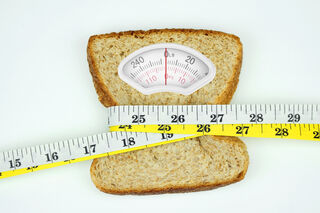Diet
Did Your Weight-Loss Resolution Fail? Here's an Easier Way
Learn how to change eating and exercise habits by avoiding misery.
Posted January 17, 2022 Reviewed by Davia Sills
Key points
- Resolutions for quick weight loss fail not because we are weak but because our bodies and minds conspire against it.
- Successful weight loss is not about willpower but about changing habits.
- To change habits, it's essential to avoid deprivation, remove triggers, and add pleasure.

Now is about the time most New Year’s resolutions break down, and number one on most lists is to lose weight. For the better part of my life, it was number one for me, too. Ultimately it became more wish than resolution, as too many failures took a toll. Starting as a teenager, I starved and stuffed within a 20 lb. range (OK, 25). And yet, eventually, I did find a way to stay slim and fit and stop dieting. I know it’s possible.
The hurdles to my success were high. My mother was a lifelong dieter and watched my weight and the size of my rear end for me. Smitten with Julia Child in my 20s, I became a hardcore cook and foodie. And I dislike sports and hate sweating.
I succeeded—briefly—at most of the many weight-loss systems I tried, which usually ended precipitously. The year after college, I got really thin and broke my diet one night on frozen chocolate-chip cookie dough that I ate raw, in a state of happy delirium, a vivid demonstration of the peril of excessive self-denial.
Then I married a man even more food-obsessed than me. For us, life is not worth living without the pleasure of delicious, calorie-dense food. But that’s not all: We crave eating without restraint. We have busy lives and need the reward and release of uninhibited indulgence. Our family celebrations, social life, traveling are all organized around great meals. For us, eating limits, let alone long-term ones, are doubly doomed.
The solution I found was the only approach we could stick to. It works. It’s not quick. But it’s also not hard.
So, what is it?
In a nutshell: incremental, dietary swaps on most days with free-eating on the others. It’s not news that weight loss is a mind-body problem. The keys are to avoid feeling deprived, to eliminate all triggers, and to add pleasure. I had to cut enough calories to get my body to give up extra pounds while not stimulating cravings. And I had to find a seriously enjoyable way to exercise—or I wouldn’t do it. It’s a forever plan. My husband and I stay trim and get fitter as we age.
I have a lot to say about this. Too much. So I am going to write another post about specifics for anyone interested in the tricks that work for me. Next time, I’ll discuss the trades we make, vanity as a motivator, how long it takes to create a new habit, and my fun-exercise strategy. For now, I only have space to explain the basics of what we do and why it works.
I arrived at my approach through trial and error and over many years, but I have looked into the science of all the weight-loss systems I’ve tried. At one point, I read through every weight-loss book in the Boston Public Library (cross my heart!). When I had the idea to write this essay, I plumbed the internet to confirm that current dietary advice and brain science back my system. What I read was heartening.
Now I know why I could never stick to a diet! It’s long been documented that severe calorie-cutting prompts the body to hold onto fat stores; our body doesn’t understand the wish to get into a smaller size but “thinks” we’re starving and so lowers metabolism and increases appetite.
But new brain studies show that our mental wiring also plays a major role. The neural networks associated with self-control are easily overcome by stress and triggers (not to mention alcohol). This is why a bad day sets us up for an ice cream binge, why we can’t ignore the chips on the bar. Short of a terrible scare—like almost choking to death on a mouthful of spaghetti—promising to give up pasta is unlikely to work.
You may feel more committed to a dire new regime if your doctor announces you’re diabetic or your daughter’s wedding is on the horizon. But even these incentives can backfire since the anxiety associated with bad news or a deadline can make you eat more. Resolutions can be worse than useless because failing to keep them can make you feel like giving up forever on your goals—and on yourself.
So, if willpower is not the route to reaching a behavioral goal, what is?
Changing habits. Lifestyle improvements are all about changing habits. We need habits: They run our daily routines on automatic pilot so that our conscious minds are free for activities that require thought. But because habits are so deeply embedded in our brains, they’re hard to change. Resolutions fail not because we’re weak and can’t say no to ourselves but because mere willpower is no match for the controlling power of neural pathways in our unconscious minds.
The answer is to strategize ways to stack the deck in our favor. To lose weight, we have to cut calories, but because my husband and I couldn’t give up unimpeded eating, we didn’t outlaw it but just limited how often we’d do it. We made a weekdays-on/weekend-days-off deal with ourselves. And I banished caloric irresistibles from our apartment on on-days.
At least initially, no kitchen cupboard (or freezer) was safe from me. I limited the delicious food I bought or made to an amount we could finish by Sunday nights. On-days involve large quantities of vegetables and lean protein and swapping foods like sweet potatoes and watermelon for baked potatoes and pie. Leaving the table feeling full is critical.
Over time, the way we eat and exercise has become a habit and so is easy to maintain. We keep making little adjustments. My husband stops himself from snacking at night by brushing his teeth after dinner, which tells his brain, “Kitchen closed!” We’ve grown to love vegetables (I swear!). And lower-cal meals during the week have come to feel pleasurable, in their virtuous way, as a balance to the weekend’s joyful excesses that taste even better in contrast.
To make a weight-loss resolution is to aspire to a rapid transformation into the person we long to be. We want it so badly; we think we can will ourselves into making it happen. But our minds and bodies conspire against us. Any promise of speed is a con: Losing weight and getting fit takes time. On the other hand, my system is not a miserable slog like dieting. It doesn’t—and mustn’t—mean not eating the foods we love, just not eating them every day. I’ve been amazed at how easy it gets.
References
Amy Arnsten, Carolyn M. Mazure, and Rajita Sinha, Sci Am. 2012 Apr; 306(4): 48–53.




